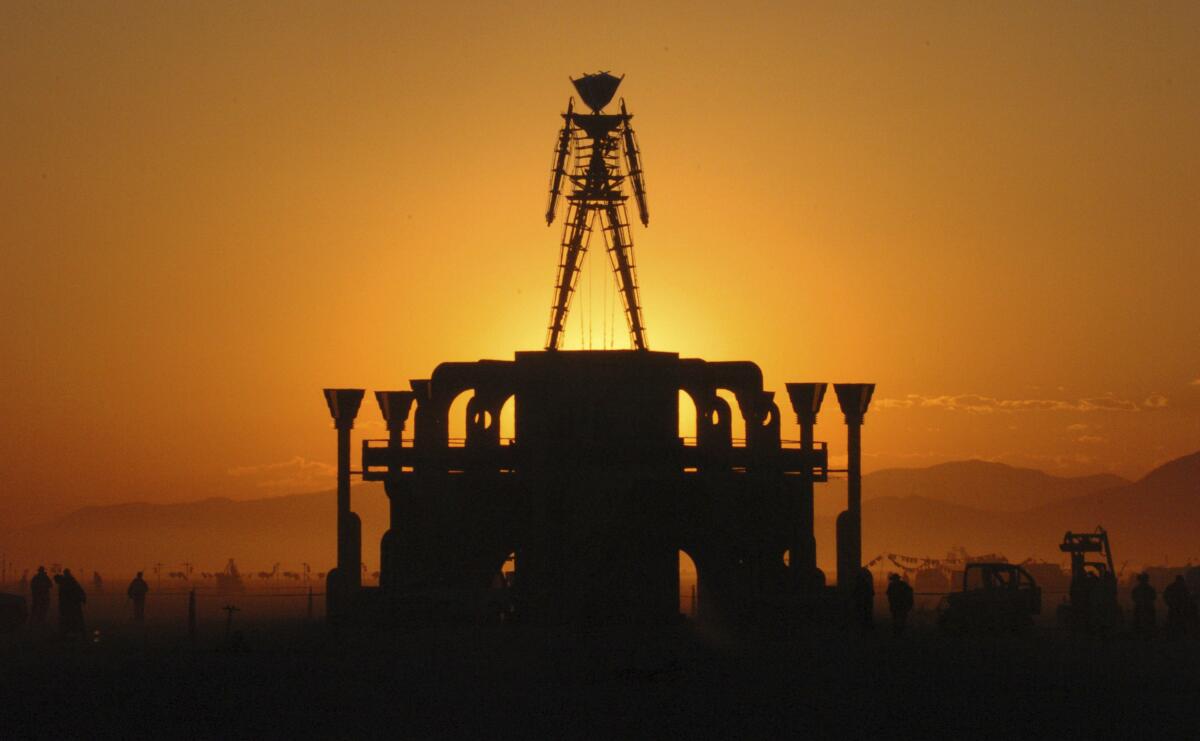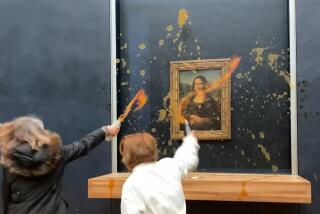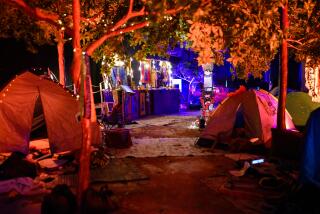Burning Man, home of ‘radical self-expression,’ removes pro-Palestinian sculpture from its website

The debates and protests sparked by Israel’s war in the Gaza Strip have worked their way into seemingly every corner in the world — even the free-spirited desert festival in Nevada known as Burning Man.
Organizers of the festival, where “radical self-expression” is one of its guiding principles, found themselves embroiled in controversy this week over the approval of a canopy-sized sculpture of a sliced watermelon titled “From the River to the Sea.”
The 8-foot-by-14-foot sliced fruit — red pulp, green-and-white rind and black seeds — has the same colors as those on the Palestinian flag and has become a symbol of solidarity with the Palestinian cause.
The sculpture was among the dozens of art installations expected to be on display just outside the festival’s center camp, but it was taken off the website when an online petition to remove it began circulating, according to the San Francisco Standard. Although the art installation is no longer listed on the website, it’s unclear whether it will be on display at Burning Man, which is scheduled from Aug. 25 to Sept. 2.
Dominique Debucquoy-Dodley, a spokesperson for Burning Man, said in a written statement to The Times that the art piece was submitted using an anonymous profile, which violates the terms of the event’s art placement submission process.
“Additionally, the listing’s content contained language understood by some to be hate speech,” Debucquoy-Dodley said. “We do not tolerate the use of violent, hateful, or incendiary language on our platforms.”
The spokesperson said the people who submitted the art installation to the website can appeal.
“Based on the circumstances around the way the listing was submitted, we believe that this is likely not an actual art piece coming to Black Rock City, but that the listing was instead intended to stir an emotional response within the Burning Man community,” Debucquoy-Dodley wrote.
Diplomas will be handed out Friday during individual school events for graduating seniors at USC.
An archived version of the website includes an image and description of the sculpture. The artist was identified only as “Decolonize Now.”
“The watermelon is a powerful symbol for Palestinians. In 1967, when Israel seized control of the West Bank and Gaza and annexed East Jerusalem, the Israeli government made public displays of the Palestinian flag a criminal offense throughout the land,” the description reads. “To circumvent the ban, Palestinians began using the watermelon because, when cut open, the fruit bears the national colors of the Palestinian flag — red, black, white, and green.”
But at the heart of the controversy was the phrase “From the River to the Sea,” according to the petition.
It says that the phrase “has been condemned as antisemitic and recognized as a call for the destruction of Israel,’’ and that the slogan “perpetuates the falsehood that Jews have no historical connection to the land between the Jordan River and the Mediterranean Sea. However, historical records demonstrate that Jewish civilization has been present in the region for over 3,000 years.”
Jewish families across the Bay Area say they’ve been disturbed by the anti-Israel rhetoric tolerated in K-12 classrooms — and the failure to understand why their kids feel attacked and isolated.
The festival is the latest to be caught up in the heated debate over the Israel-Hamas war, which started after the Oct. 7 terrorist attack by Hamas militants in which hundreds of Israelis were killed or taken hostage. The U.S. designated Hamas as a terrorist organization in the 1990s.
The war, however, has killed more than 30,000 Palestinians, including many children, according to the U.N. The death toll and humanitarian crisis in Gaza have sparked antiwar demonstrations across the U.S., including at universities.
So far, the online petition to remove the watermelon sculpture has collected slightly more than 1,000 signatures, and it includes comments from people who signed it.
“Burning Man should not be allowing an installation of a watermelon representing political statements against another group,” one person wrote.
“This is just crazy that this art was approved after what’s going on in the world after Oct. 7, it needs to be removed ASAP,” another wrote.
More to Read
Sign up for Essential California
The most important California stories and recommendations in your inbox every morning.
You may occasionally receive promotional content from the Los Angeles Times.













